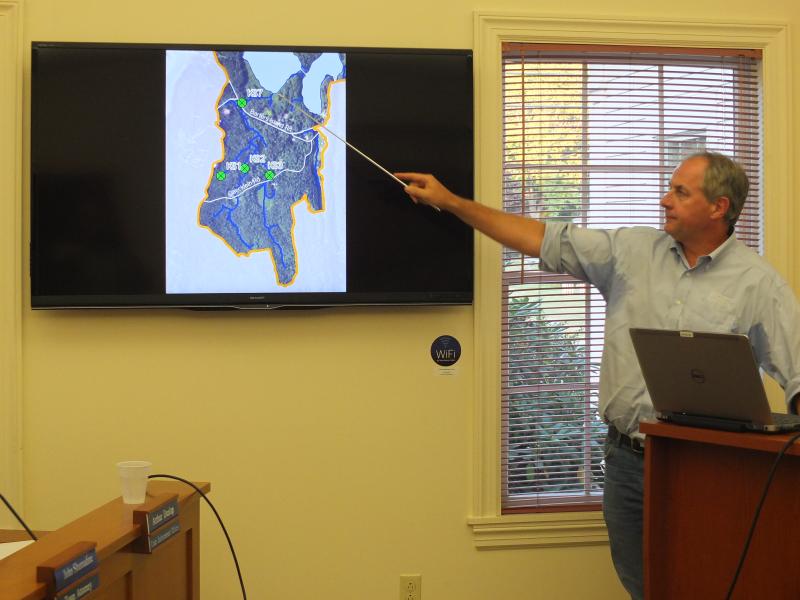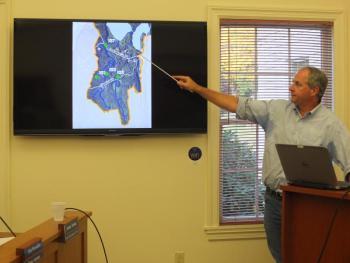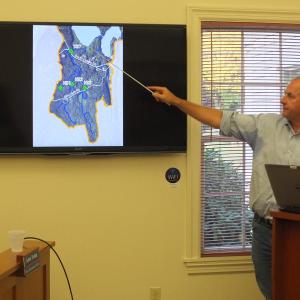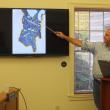Board of Appeals reviewing 2014 NH lawsuit in considering CMBG permit
The Boothbay Board of Appeals is reviewing a 2014 U.S. District Court judgement in considering whether or not to grant Coastal Maine Botanical Gardens a building permit. The Gardens received a building permit in December from the planning board, but CMBG’s Gaecklein Road neighbors, the Anthony family, appealed the decision.
The first of four hearings began on March 1. During the Aug. 31 hearing, Barters Island Road resident Paula Arsenault encouraged the five-person board to consider Wright-Pierce’s responsibility in engineering and constructing a municipal wastewater system for Wolfeboro, New Hampshire. The Wolfeboro septic system was designed to support 600,000 gallons per day, but it began showing signs of failing about a month after being installed, according to U.S. District Court documents.
The failure resulted in Wolfeboro suing Wright-Pierce who designed and constructed the $1,050,000 wastewater system. On May 5, 2014, the jury awarded Wolfeboro $6,795,000, concluding Wright-Pierce violated New Hampshire’s Consumer Protection Act. Board of Appeals members are searching for relevance between the Wright-Pierce wastewater system being designed for CMBG’s expansion and Wolfeboro’s failed system.
Arsenault is concerned about the expansion project’s impact on the Knickerbocker Lake Watershed. She spoke during the two previous hearings about the environmental impact of allowing the wastewater system and paved parking lots in the watershed. On Aug. 31, she brought up a point the Anthony family or their lawyer hadn’t: The $6.795 million lawsuit won by Wolfeboro over Wright-Pierce. In October 2014, the court was considering whether to double or triple damages, as part of New Hampshire law, when the two parties settled.
This led to a debate among appeals board members over whether or not to consider the Wolfeboro lawsuit. Board member Scott Adams owns property in Wolfeboro, but admitted he didn’t know any of the lawsuit’s details. He recommended examining the lawsuit. “This has been brought during the public comment section and may be pertinent. This case deals directly with failure in a system and is worth looking at.”
Appeals board lawyer John Shumadine had doubts about the Wolfeboro case’s bearings on the proceedings. “I’m not completely sure this is relevant, but if you’re going to bring it up then the parties should be also be heard,” he said.
CMBG lawyer Mary Costigan also doubted the Wolfeboro case had any relevance in granting CMBG a permit. “It’s a different system in a different state,” she said.
On Sept. 7, Wright-Pierce CEO and President John W. Braccio responded via email about how the Wolfeboro and proposed CMBG wastewater systems compared. “The Wolfeboro treated municipal wastewater effluent disposal system is a rapid infiltration basin that handles an average flow of around 400,000 gallons per day. The Coastal Maine Botanical Gardens treated wastewater effluent disposal system is a much smaller and different subsurface type disposal system that will handle an average design flow of 10,000 gallons per day,” he wrote.
Kevin Anthony’s property abuts CMBG. He, along with his parents and brother, appealed the planning board’s granting the CMBG permit. Anthony thought introducing the Wolfeboro case during the prior planning and current appeals board hearings wasn’t the best use of time.
“Because from an engineering standpoint, and (CMBG’s is) being built on a hill, so in that regard it is a little irrelevant,” Anthony wrote in an email. “It’s just a difficult point to raise given the structure of the meetings and immense amount of deceit and outright lies we have to correct in a limited time. The dishonest way Wright-Pierce acted in this Wolfeboro debacle is, however, relevant. I guess in the end, we are just a little reluctant to drag somebody through the dirt publicly.”
The court documents Shumadine provided to appeals board members detail why the New Hampshire jury ruled in Wolfeboro’s favor. The document explained Wright-Pierce set an effluent goal of 600,000 gallons per day for the rapid infiltration basin system at the 1-A Wolfeboro site, but the firm knew it didn’t have the data to make that representation. Wright-Pierce continued working on the investigation and documentation necessary in obtaining permits from the New Hampshire Department of Environmental Services.
In early 2007, Wright-Pierce hired Jesse Schwalbaum of Watershed Hydrogeologic, Inc. to develop a groundwater computer model of the RIB system at the Wolfeboro 1-A site. Wright-Pierce intended to reverse engineer the model supporting an intended result of 600,000 gallons per day. Schwalbaum relied on data and information provided by Wright-Pierce and did not do any investigation of the site himself. When Schwalbaum reported the model did not support a flow capacity of 600,000 gallons per day, Wright-Pierce directed him to alter the model without any new data supporting the changes to achieve a 600,000 gallons per day capacity result.
Wright-Pierce knew when it directed Schwalbaum to alter the model that data from investigations at the Wolfeboro 1-A site contradicted those alterations. Later, Schwalbaum reported to Wright-Pierce the model would not support a flow of 600,000 per day and recommended only 400,000 gallons per day. Peter Atherton of Wright-Pierce knew that the Wolfeboro 1-A site did not have a flow capacity of 600,000 gallons per day, according to court documents.
In a Sept. 14 letter written to the appeals board, Costigan wrote “as set forth in more detail below, the Wolfeboro case has no bearing the application being review by the board.”
Costigan stated three reasons why the Wolfeboro case wasn’t relevant to the application. First, she cited differences in the two septic systems. Second, in the Wolfeboro case, Costigan indicated Wright-Pierce’s claims were based on certain representations made by an individual no longer employed by the company. And third, since the lawsuit was settled, she reasoned there was no final resolution by the court upon which the board could rely.
“CMBG is fully confident in the wastewater system designed by Wright-Pierce for this project. Wright-Pierce is a firm that specializes in wastewater infrastructure and has been providing services to Maine communities and businesses for over 70 years. The majority of Wright-Pierce’s work is on municipal wastewater collection and treatment facilities. Wright-Pierce has designed countless projects, including award winning upgrades in Manchester, New Hampshire and Falmouth, Maine wastewater treatment facilities.”
Anthony family lawyer, Sarah McDaniel also wrote a letter. She reminded the board about the U.S. District Court’s opinion finding Wright-Pierce liable on the counts of professional negligence, negligent misrepresentation, and fraudulent misrepresentation.
“What is enlightening in these documents is that Wright-Pierce was found to have told its clients and permitting entities the system they designed met necessary capacity, even when they knew data showed it could not. Both the jury and judge concluded Wright-Pierce knowingly misrepresented its data,” McDaniels wrote.
The appeals board will meet at 6 p.m. on Thursday, Sept. 21 in the municipal conference room. The two opposing lawyers will each have 15 minutes to discuss the Wolfeboro case’s relevance. The hearing will then proceed to closing statements where each lawyer will be given five minutes.
The board will begin deliberations. Once the board concludes deliberating, it will inform its legal representative, Shumadine, how it wishes to proceed. Shumadine will draft a ruling regarding the majority view and an official vote will take place at 6 p.m. Thursday, Oct. 4.
Event Date
Address
United States


























